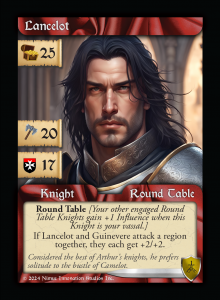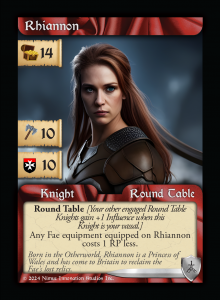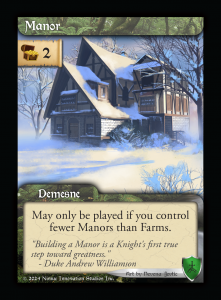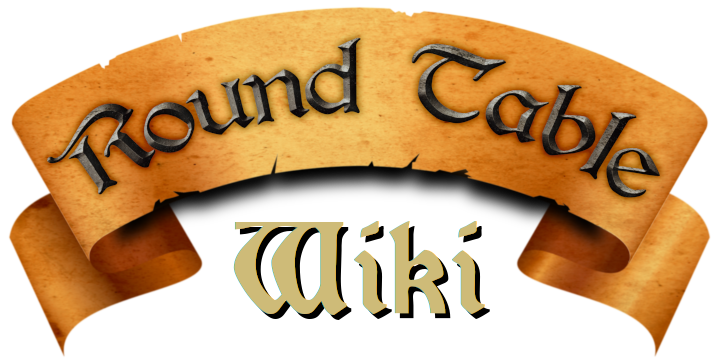What Is Round Table?
We’ve been writing a ton about Round Table, our new trading card game (TCG) but we haven’t had a single, clear post answering the question: What is Round Table? How do I get started? What’s included in a Starter Deck? Or a Treasure Pack? Let’s get those answered!
Round Table Basics
The Trading Card Part
Round Table is a trading card game. We have 204 main deck cards, 20 demesnes (lands), and 30 regions (the goal of the game). Cards come in a Starter Deck or a Treasure Pack (a booster) and players can either play their starter deck “as is” or they can construct a deck using cards from their collection. Because it’s a trading card game, it means that there are different cards with different rarities and different abilities. It doesn’t mean all of the powerful cards are legendary (the rarest cards) or that all of the weak cards are common (the most prolific). Rather, there’s a blend across all of the different card types to balance the cards and rarities. But let’s talk about rarity briefly.
Rarity

Rarity is how many of any particular card is printed versus other cards of other rarities. In Round Table, we chose some simple ratios of our different rarities.
The rarity with the most printed cards is Common. These are the ones you’re most likely to get copies of when buying Starter Decks or Treasure Packs (which we’ll describe in a bit). A shield in the lower right with a steel-colored face can identify common cards.
Uncommon cards are the next rarest and they’re less common than Common cards. Uncommon cards can be identified with a copper-colored shield in the lower right corner.
Next is Rare – there are many fewer copies of each Rare card than Common or Uncommon cards. Rare cards have a silver shield in the lower right corner.
The rarest cards are Legendary (as Lancelot to the right is). These are the fewest in number of all the printed cards. Legendary cards have a gold shield in the lower-right corner. Again, they aren’t necessarily the most powerful cards – there are just fewer of them in print than the other rarities.
Why a Trading Card Game?
We chose to make a trading card game because when we started playing trading card games decades ago, it was exciting to discover new cards and learn new abilities. The worldwide web wasn’t very mature then, so card lists weren’t available. People couldn’t just look up all of the cards online. While we live in a different era today, we wanted people to have that same sense of excitement and discovery upon opening a deck or a pack we originally had. Not knowing what they were going to get and being thrilled when they found a great card they could build a deck around. That was exciting for us when we started and we hope that our players get to experience that same feeling.
Community
Trading card games also encourage community-building and engagement. You’re encouraged to meet with other players, learn about their decks, figure out their strategies – and devise ways to defeat them! And to be able to trade cards in your collection for cards you don’t have – or for extra copies of cards to make your decks work better. It’s all about getting together, having fun with a group of people, and exchanging ideas and sometimes cards. Because we live in The Future (TM), we’ve created a Discord where you can meet virtually with other people in the community, share your ideas, and perhaps even meet up at your local game store to trade and play!
Not Like Other Trading Card Games
We were focused on trying to create a game with balanced gameplay that allows players to do something every turn and rewards good strategy and tactics, not just luck. Some of the trading card games we’ve played in the past reward fast development and quick play over fun, interesting, tactical, and strategic play. We wanted everyone to have a chance to do something and to have a good time while they did. It’s a little frustrating when you have to sit and watch your opponent create a combo that does 8,000 damage to you. We also did away with direct damage to either players or their creatures. Instead, the attacks are focused on the regions. Because of that, the gameplay requires creativity and not just brute force.
We also wanted to make the game as flexible and quick to play as possible, so we don’t require playmats with special zones or anything. And while we did create playmats, they’re purely aesthetic.
Card Types
There are five main card types with some subtypes in Round Table. These are:
Knights

These constitute your main army. They range from the newly knighted to the highly experienced and deadly. Some are monarchs, some are members of the Round Table, and some are members of the very exclusive group – the Grail Temple. All, however, have influence (strength) and resistance (defense) to fight battles on your behalf. A knight’s influence and resistance may be improved by giving them equipment and granting them titles. They might also have abilities that affect other knights you control. Round Table knights, for instance, improve the influence of other Round Table knights you control (as can be seen on Rhiannon).
Equipment
You provide equipment to your knights to make them stronger, have better defense, or grant them abilities to help your other knights. There are four different kinds of equipment – armors, mounts, shields, and weapons. Knights can only equip one of each type, but these run the gamut from very basic and serviceable to otherworldly and powerful.
Titles
You can grant your knights titles to give them a boost to their influence and resistance or to grant them abilities to help your other knights (same as equipment). These include special orders of knighthood and ranks of peerage.
Quests
Quests are what knights are known for and Round Table offers many unique experiences for knights. They allow you to send your knights on noble excursions or distract your opponent from using knights to attack. There’s a reward when quests are completed and the controller gets to draw cards as a result. This can be useful to you if you need more cards in your hand or could make your opponent have to discard cards if they have too many.
Redirects
Redirects allow you to get your knights back on task (if they’re heading off on a quest you don’t want them to do) or if you want to trick your opponent by moving knights to a different target – or redirecting their knights to another region! It can be this kind of last-minute strategy that wins the game for you.
Demesnes

Demesnes are the lands in Round Table and provide the resources for you to recruit knights and keep them in your employ, along with their equipment and titles. You start with a Farm and then you can upgrade that farm with other demesnes – a Manor, a Large Manor, a Keep, and a Castle (in that order). Each improvement adds resource points to your pool, allowing you to recruit more powerful knights, equipment, and titles, as well as play more quests and redirects. If you complete a full stack (Farm, Manor, Large Manor, Keep, and Castle), you have 25 resource points available. That could recruit a powerful knight like Arthur or Lancelot to your cause!
Regions
Regions are the goal of the game and each region has a Renown value to denote how powerful it is and how influential it is in Britain. You will be using your knights to attack different regions and try to conquer them before your opponent does. While we strongly encourage casual play, we do have rules available for competitive tournament play. Those rules can be found in the wiki for the game and determine which regions need to be used in each format. There is also a grand melee format that uses a lot of regions and takes a long time, but it can be really fun, especially with a lot of players!
Basic Gameplay
The game is played over the seasons of a year. During each season, certain actions are permitted. One player – the active player – takes their turn first. Other players follow suit until all players pass and the season advances to the next one. When the seasons turn from Autumn to Winter, the active player changes to the next player (or the other player in a two-player game).
Season Description
Spring
Players can bring up to one demesne from their hand into play, either starting a new set of demesnes with a Farm or improving on a set by playing a Manor, Large Manor, Keep, or Castle. You can also recruit knights from your hand, play equipment, or grant titles by paying the appropriate resource point (RP) cost. Unlike other games, you have to continue to pay for those items you bring into play.
The active player completes their actions first and other players take turns in clockwise order. Once both or all players pass, play advances to Summer.
Summer
Players can declare attacks by moving their knights to the region they are attacking. Not every knight needs to be committed at once – players can declare one knight, wait for their opponent to take an action, and then respond to that by moving another knight to attack. You can also send your knights or your opponent’s on quests or use redirects to move them between different tasks. The Game Rules in the wiki have more information about how this works.
Once all attacks, quests, and redirects have been played and both players have passed, play moves to Autumn.
Autumn
Resolving Quests
This is when all quests and attacks are resolved. When resolving a quest, the controller of the quested knight must draw cards equal to the number of RP that were used to play the quest. For instance, if a quest was played using 3 RP, the controller will have to draw 3 cards. They can choose which deck – demesne or main deck – they draw from. If they are unable to draw that number of cards, the game ends and a winner is determined. Note this isn’t a loss condition – just an end-game condition.
Resolving Attacks
The other resolution is around attacks. The influence of each attacking army is calculated and then the resistance for each region and the resistance of other armies attacking that region are added together. If the influence of an attacking army meets or exceeds the resistance of the region and the other armies, the region is captured. If it doesn’t, the region stays independent. This process is repeated for all players. Any captured regions are moved to that player’s play area and the region is replaced with a new region from the region deck. If there are no more regions, skip this step.
Once all of the quests and attacks have been resolved, play moves to Winter.
Winter
Winter has only one action players take, which is to draw a card. The main change, however, is that the active player moves to the next player.
End of the Game
The game ends when one player is unable to draw a card or the last region is captured. Players figure out how much renown they have from their captured regions and whoever has the most renown wins the game. If there’s a tie, then the game is a draw.
How Do I Get Started?
Now that you have an overview of the game, how do you start? It’s very easy. There are two different packages of cards you can purchase: starter decks and treasure packs. Getting a starter deck is all you need. Each starter deck has 72 cards – 45 main deck cards (knights, etc.), 20 demesnes, 5 regions, and 2 rules cards. Starter Decks are intentionally crafted to be playable out of the box. They also have 5 regions (needed for a game) and even a turnkeeper to track the active player and the current season. There’s even a QR code linking to the rules and our site.
Treasure packs, on the other hand, are intended to augment your collection. Your starter deck may need some adjustments to be truly competitive, so treasure packs provide 18 more cards (15 main cards and 3 regions) to give you more cards for your deck. It’s then up to you to pick the right cards to add to your deck.
Your Future in Round Table
Round Table has 204 main cards, 20 demesnes, and 30 regions. There are a lot of cards to collect if you want to “catch ’em all“, but your journey begins with a starter deck. After that, it’s up to you. How much you want to collect versus making competitive decks and playing in tournaments is up to you. We are partnered with Carde.io for organized play. You can register with that link and find a tournament near you.
You can purchase Round Table directly from us via the link on the right or you can talk with your local game store to get Round Table into the store. We want people to find the game in their local store. But YOU are the ones who can make that happen. Let them know you want to get the game from them.
Round Table Roadmap
We have a ton of plans for the future of Round Table. We want to create an expansion around magic, including Merlin and Morgan le Fay, adding in sacred and magical sites… So many ideas! And we want to expand to include the rest of the British Isles by adding Scotland and Ireland to the game. And that is just the start. We’ve talked about adding in Scandinavia, Gaul and France, the Moorish lands, the Holy Land, and a ton more. There are so many more options – we just need your help to let people know about our game!
Any Questions?
If you have any questions about this article or the roadmap, please reach out to us at contact@nimuestudios.com. We are really good about responding quickly. And you can join our mailing list to stay up to date on our game. We promise not to spam your inbox!

